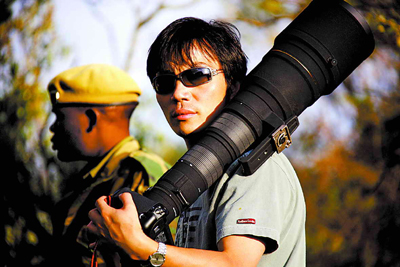He is a billionaire with the largest bakery chain in China, a
well-known photographer who has held dozens of photo exhibitions at
home and abroad and several of his collections have been
published.
Luo Hong is also the environmentalist and philanthropist who
funded the first individual environmental protection foundation at
the United Nations.
Yet rather than all those titles he says he prefers to be known
as "just Luo Hong, a son of nature".

The mantra has since 1995 inspired the short, lean and tanned
man to travel throughout China and Africa discovering and recording
natural beauty through his camera lens. It has also led him to
start a green fund with an initial investment of 2 million yuan to
help environmental protection in China and Africa.
He now goes to Africa twice a year on photography treks. He has
pledged to increase funding to his foundation to 10 million yuan by
2010.
Eloquent about animals
Luo is not talkative, and is nervous when giving speeches. At
the inauguration ceremony for the Luo Hong Environment Foundation,
he delivered his talk in his native Sichuan dialect "which made me
feel more at ease", the 40-year-old man says.
But when speaking about natural scenery and animals, Luo becomes
eloquent and passionate. He likes to showcase photos he has taken
during 16 different African trips, such as a herd of migrating
gnus, flamingos searching for fish and lions at play. And he likes
telling the stories behind the stories - how he rented an army
plane to capture Mount Gonggar on his camera, or waited for days in
the scorching sun to get the scene of giraffes at sunset, as well
as managing to escape from a herd of mother elephants angered by
Luo's camera aimed at their offspring.
Born in mountainous rural Sichuan Province, Luo's love of nature
is in his earliest childhood memories: lush mountains, clean
rivers, green trees and a multitude of animals. Because "the
beautiful scenes in my lenses further touched my heart, I knew I
should do something to keep those things alive", says Luo.
Luo Hong presents his
photography books on wildlife in Africa to children.
He thinks that his love of photography may be something he was
born with. When Luo saw a Seagull-brand camera at the age of 12, he
was immediately fascinated. Crazy about the gadget, the young boy
later dropped out of school at the age of 16 to become an
apprentice in a photography studio. Two years later he opened his
own shop, making a living by taking pictures for others and selling
landscape shots of rural Sichuan.
As his small business dropped into the red, he started a cake
shop business in 1992 and developed Holiland to be the No 1 Chinese
bakery brand despite market fluctuations and many difficulties.
Business support
Luo admits that business success supports his hobby of
photography and his dedication to environmental protection.
Holiland now has nearly 800 stores in more than 60 cities across
China, selling 30 tons of bread and cakes daily and 200,000 tons of
moon cakes annually. Its 2007 earnings are expected to hit 31.6
billion yuan. After 15 years of operation, Holiland has developed a
stable and mature management team.
Cakes and bread, moon cakes and sweet dumplings currently make
up the three product lines of Holiland, contributing over 60
percent, over 20 percent and nearly 10 percent of the bakery
giant's total revenue respectively.
To avoid juggling his passion with his day job, Luo in 2006
appointed Xie Li, a 35-year old former KFC manager who worked for
the company for eight years, to be general manager and executive
vice-president of Holiland. He has decided to relinquish his
position as president sometime soon in a bid to devote more effort
to photography and philanthropy.
Luo's foundation under the United Nations Environmental Program
recently held an environmental protection painting competition for
children in China to use their creativity and imagination to
portray action they can take to protect the environment. The Luo
Hong Environment Foundation has started five other programs since
its establishment. They include construction of the UNDP's Chinese
language website, protecting flamingos in Kenya's Lake Nakuru
National Park, training young global leaders engaged in
environmental protection, alleviating conflicts between people and
elephants in some African nature reserves, as well as addressing
environmental issues related to the Beijing 2008 Olympic Games.
Some observers say environmental photography is part of
Holiland's marketing strategy.
Beginning last year, giant posters of spectacular African
scenery photographed by Luo have appeared on the walls of Beijing's
metro stations. The breathtaking images of Africa do not come with
a commercial tagline, yet insiders say they create a strong impact
that make the names of Luo Hong and Holiland memorable.
Luo has also held a series of solo exhibitions in key cities. He
provided free tickets for Holiland customers and donated money to
green organizations raised by photo auctions. The environmentalist
says such activities aim to open a window for people to know the
beauty of nature, while critics assert the effect is building
Holiland's green image.
Luo, who does not want to comment on those assumptions, claims
that he will be satisfied as long as he has enough to continue his
photography and environmental philanthropy.
"I am more of an impulsive type. I have found the real
excitement of my life and exactly know what I want, that's enough,"
he says.
The following are some of Luo Hong's photographic works:
(China Daily, China.org.cn?January 7,
2008)